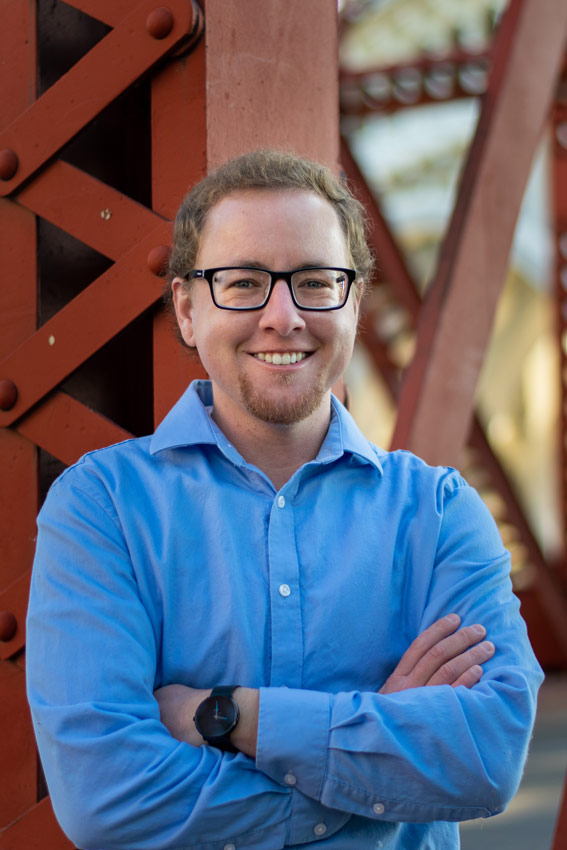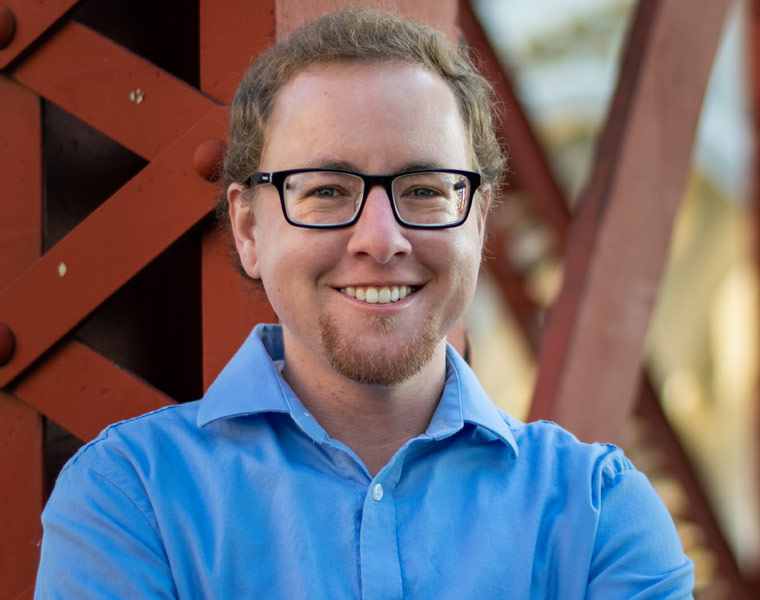
As president of Graduate Student Council (GSC), sixth-year PhD candidate Aaron McPeck is an essential link between the university’s administration and its graduate and professional students. It’s a role he relishes as an aspiring higher education administrator.
“I love watching people succeed, and when I’m in a place where I can help somebody else do that, that’s really rewarding for me,” he said.
McPeck joined the GSC leadership during the 2019-20 year as the director of academic affairs, and soon landed his position as president. But he stepped into that role amidst the COVID-19 pandemic, at a time when graduate students faced unique challenges. It led him to reconsider much of what he knew GSC to be.
While GSC traditionally focused on programming like a back-to-school picnic and weekly happy hour gatherings, the organization’s work shifted to advocate for what graduate students needed most amid the pandemic, including access to mental and physical health resources.
“The change that I saw between pre-COVID and COVID was a change from connection-building to advocacy,” McPeck said.
But McPeck still values the connections he’s made across the university through GSC. While graduate students have diverse needs due to their varied programs of study, McPeck has noticed similarities among them. For example, he noted that it’s important that graduate students be seen as whole people who are often balancing studies at the same time as professional obligations and other commitments. Graduate Student Appreciation Week, which took place this week, is an opportunity for the campus community to recognize what graduate students contribute to CWRU.
“We bring such immense diversity of backgrounds and experiences, academic and social interests, and professional contributions to this community,” McPeck said. “Seeing those recognized makes us feel it does matter more and that we’re seen for not just for our own personal worth, but how we connect to the community as a larger whole.”
The path to postgraduate education
McPeck arrived at Case Western Reserve six years after completing his undergraduate work in double bass performance at the Eastman School of Music in Rochester, New York. During that time, he served in AmeriCorps for a year working at a nonprofit arts center as a grant writer and then at an anti-bullying and anti-violence organization.
His work in nonprofits fed his interest in serving in administration.
Though his undergraduate work was in performance, McPeck found himself instead drawn to musicology, a field that focuses on how music works and is culturally involved.
“I had this insatiable curiosity about the music I was listening to,” he said.
When trying to arrive at a dissertation topic, McPeck met with his advisor, Daniel Goldmark, who asked what McPeck enjoyed doing for fun.
The answer was sharing music videos with his friends. And the two arrived at a topic for McPeck, whose studies are ingrained in identity within music: representation in music videos.
“I can do that?” McPeck remembers questioning. Goldmark assured him he could.
Now, McPeck’s research centers on examining the techniques music videos employ to create representations of race, gender, sexuality and other identities.
“If you watch a music video without sound on, it is the most bizarre thing you will ever watch, even the less coherent ones, and not many of them are actually coherent when you take away the music, so why that music sutures all that together into something that makes sense is of interest to me,” McPeck said.
Aside from his studies and his role as GSC president, McPeck has been involved on campus in a number of capacities. These have included serving as a member of the COVID planning team as a student voice, a volunteer working on a data initiative project in the Office of Postdoctoral Affairs, on programming and selection committees for the Department of Music’s graduate student conferences, and a department senator for the Graduate Council of Arts and Sciences.
“I enjoy having connections to my department and in my program specifically within that department, as well as the larger picture, school-to-school relationships,” he said.
Get to know more about McPeck with this week’s 5 questions.
1. What is something cool you’ve learned at CWRU this year?
I’ve learned about the experiences of students across campus and how a bunch of programs work. There’s a certain joy in realizing the similarities among disparate disciplines as well as in being curious about the differences.
2. Do you prefer to get work done early in the morning or late at night?
Late at night, 100%. I save time in the morning to have coffee and read in my rocking chair, and that sets the tone for the rest of the day. After that, I find I build momentum and energy toward the evening, which is when I do my best work.
3. What do you consider the greatest invention?
Although writing obviously came first, the printing press revolutionized the storage and dissemination of information. Inequalities always exist, but I think the printing press helped open up education to the masses in a way that ultimately modernized society.
4. Outside of school and work, what is your favorite way to spend time?
I love spending time with my old dog, Shelly, and I can’t get enough of board games. When the weather is nice, I fish—when I’m lucky, I catch.
5. What’s your favorite thing about Case Western Reserve?
Everyone says the people, but I’d go a step further and say it’s the relationships. Whether with a mentor, a professor, or a friend, I’ve been fortunate to build relationships I find meaningful and I hope others have, too.

